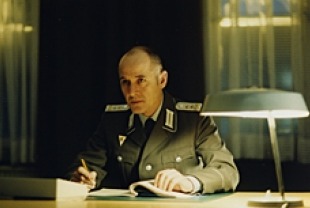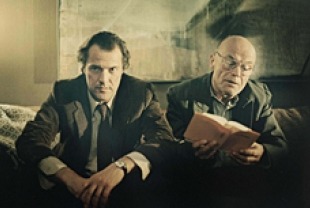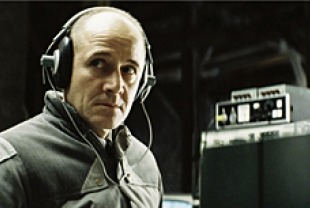"At its best, privacy shields and nurtures what is unique and authentic in people, while its absence or its violation often contributes to dehumanizing them," Janna Malamud Smill writes in Private Matters: In Defense of the Personal Life. "Privacy shelters, and thus offers sustenance to fragile virtues."
Welcome to the grim world of East Germany in 1984 where the powerful Stasi, the secret police, keep watch over the totalitarian society. To accomplish this feat, they employee 100,000 people and rely upon twice as many other individuals who serve as informers. This gripping German film, been written and directed by Lorian Henckel von Donnersmarck, vividly conveys the atmosphere of fear, distrust, and suffering that pervades a society where spying on others is the modus operandi. It's also a warning that unless vigilant care is taken by citizens today, governments can try to justify creating a similar system in the name of providing security against terrorists. In many countries, privacy is already a luxury of the past.
Captain Gerd Wiesler (Ulrich Muhe) is a seasoned veteran in the Stasi whose specialty is interrogations. One way or another, he is usually able to get to the truth hidden behind the fabrications of those he is questioning. Wiesler lands a job teaching spies but still wants to be in the field on assignment. One of his superiors, Lt. Col. Grubitz (Ulrich Tukur), gives him the okay to start surveillance of Georg Dreyman (Sebastian Koch), a successful playwright who is dating Christa-Maria Sieland (Martina Gedeck), a beautiful actress. Wiesler and Grubitz are formidable opponents of anyone who may indicate any sympathy with the West or break the rules in any way. A good example of their strictness is the case of a Stasi staffer who tells a joke about the East German leader Erich Honecker and is eventually forced to pay the consequences.
Once the playwright's apartment is wired, Wiesler and an assistant begin monitoring all of his activities. Wiesler is a true believer in the rightness of his work, and so he is taken aback when he learns that Minister Bruno Hempf (Thomas Thieme), a former Stasi officer now turned Head of the Cultural Department, is forcing Christa-Maria to have sex with him and paying her off with drugs. Wiesler has great respect for this actress, and his morality is offended by this. He also is shaken by the grief that overtakes Dreyman when his friend, director Albert Jerska (Volkmar Kleinert), commits suicide after having his career wrecked by the Stasi.
One of the best scenes in The Lives of Others is a small one that signals that a transformation has taken place in Wiesler during his surveillance of the playwright. Standing in an elevator in his own apartment building, he is joined by a little boy with his football who looks up at him and asks, "Is it true you work for the Stasi?" Wiesler is stunned and can only reply, "Says who?" The boy responds: "My father." Habit kicks into gear, and he asks, " So what is the name of . . ." before stopping in mid-sentence. "Of what" the boy asks. A few seconds of awkward silence and Wiesler responds, "Of your football?" The boy is surprised and says authoritatively, "You're crazy! Footballs don't have names!" It is this kind of attention to detail and intelligence that makes The Lives of Others one of the best foreign language films of the year.
Special DVD features include: deleted scenes; the Making-of; an interview with director Florian Henckel Von Donnersmarck; and a commentary by the director.





